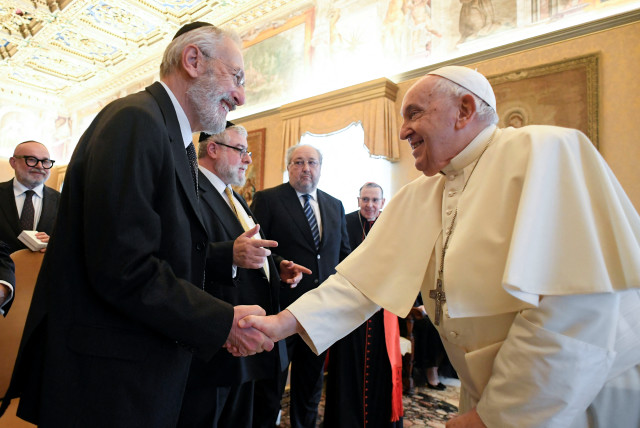European conference on combating antisemitism: 'The fight must be international'

The conference featured various speeches and panels by European leaders, and focused on combating antisemitism and future actions that need to be taken to protect European Jewry.
In cooperation between the Free State of Bavaria in the EU and the Conference of European Rabbis (CER), an event titled “Is there a Jewish future in Europe” took place earlier in May. The conference focused on the question of what elements are missing in protecting Jews across Europe from increasing antisemitism, both online and offline.
The event was held at the mission's headquarters in Bavaria and saw a gathering of over 130 senior stakeholders in the EU, as well as senior representatives from the European Commission, the French government, the Bavarian authorities, Jewish leaders and other religious leaders. The discussions centered around the main issues highlighted in the Manifesto for Jewish Life in Europe.
Conference sought to highlight paths to combat antisemitism
The manifesto recommended combating antisemitism by increasing legislation against physical and online hate, improving funding for educational resources, increasing synagogue security, improving cooperation with the police and local communities to establish effective security systems, and calling for interfaith dialogue to promote moderate religious practices. It also called for integration and positive citizenship to counter extremism and terrorism.
The manifesto publishes a call to action for the governments of the EU member states and EU institutions to combat the rise of antisemitism and protect Jewish religious practices.
During the event, Aurore Bergé, who serves as France's Minister for Gender Equality and Fight against discrimination, gave a video statement with information about the actions taken in France against antisemitism, religious extremism and hate speech.
After launching the conference on May 6, Bergé repeated her government's commitments to fight "the scourge of antisemitism everywhere."
"We are waging a determined and relentless battle against antisemitism in all its forms, including renewed forms. This battle is national, it is European, it must be international," she added.
There was a panel discussion with the participation of Chief Rabbi Pinchas Goldschmidt, President of the Conference of Rabbis of Europe and recent recipient of the Charlemagne Prize, Dr. Ludwig Spanella, and Katharina von Schnurbein, the representative of the Bavarian government for Jewish life and the fight against antisemitism.
There was also a representative from the European Commission, Peter Neumann, and Sir Julian King, the former British European Commissioner and former British Ambassador to France and Ireland.
The panelists discussed the Commission's strategy to combat antisemitism and highlighted the actions that still needed to be taken, particularly by national governments to urgently improve the safety and well-being of Europe's Jewish communities.
Chief Rabbi Goldschmidt emphasized the urgent context of the conference, saying, "In this period before the European elections, our manifesto calls on European leaders to commit to the fight against antisemitism with renewed vigor and determination. The European Union has ambitious commitments to protect the Jews in Europe. Our focus must now be on the national governments that can implement the necessary measures. The future of Europe depends on our collective efforts to ensure safety and well-being."
Philip Igner, the director of Bavarian education in the European Union, told Maariv, "Love conquers all. What we must learn is to love each other and learn about each other. Hatred comes from not knowing each other. I think it is important to educate each other about different cultures and religions."
Peter Schweiger, a former diplomat of the European Union who was present at the event, told Maariv that the role of the civil authority is to enforce action against hatred. "We must work together as people to fight hatred. This hatred should not be around," Schweiger noted.
In an exclusive interview with Maariv, Sir Julian King said, "We have a lot to learn from each other, and from different countries including Britain from Europe and Europe from Britain. I think Britain is trying to fight antisemitism very hard and we are implementing programs from other countries. In the end, Europe also learns from Britain - reporting hate crimes in the UK is far more effective than anywhere else."
"Organizations are working together to create an effective reporting system that others can learn from that will create a more effective way to fight antisemitism. As a former EU security chief, I can say that I think antisemitism is a threat to European security."
Dr. Yohan Stöger told Maariv, "My work is police security between countries to fight drug and terrorist activity, and sharing intelligence between countries. I think we should also look into combating and providing intelligence on hate crimes such as antisemitism so that countries can fight the phenomenon. In this way, countries can be warned in advance about a person who is accused of hate crimes, and can protect Jewish communities ."
Jerusalem Post Store
`; document.getElementById("linkPremium").innerHTML = cont; var divWithLink = document.getElementById("premium-link"); if (divWithLink !== null && divWithLink !== 'undefined') { divWithLink.style.border = "solid 1px #cb0f3e"; divWithLink.style.textAlign = "center"; divWithLink.style.marginBottom = "15px"; divWithLink.style.marginTop = "15px"; divWithLink.style.width = "100%"; divWithLink.style.backgroundColor = "#122952"; divWithLink.style.color = "#ffffff"; divWithLink.style.lineHeight = "1.5"; } } (function (v, i) { });

